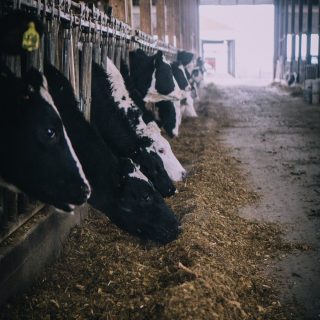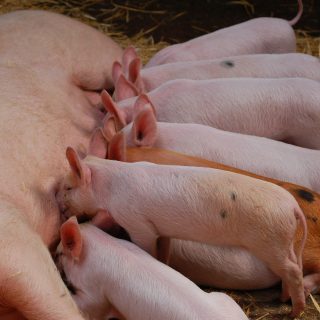She takes care of nearly two thousand cattle and seven thousand pigs but she also visits farms, she’s called to attend to horses and she even works as a substitute in a small animal clinic. Dr Anna Schwahofer, a Univet graduate of the year 2014 talked about how she could stand her ground in the formerly male-dominated livestock care.
What do you do exactly?
I do a lot of things, basically, but my main focus is livestock. I work as a vet for three livestock farms, two of which have dairy cows with a population of about 1000 animals each, including the offspring. One of the farms actually breeds beef cattle, too, which means about 600 more animals. I also work at a pig farm where I am responsible for 500 sows, about 2000 pre-fattening pigs and 5000 fattening pigs. I also do house calls and I provide care for about 60 horses, too. Sometimes I substitute in a small animal clinic that belongs to a friend of mine. You could say I deal with all animals larger than cats.
 What does your activity look like at a livestock farm? What tasks do you have?
What does your activity look like at a livestock farm? What tasks do you have?
First of all, you have to get up quite early. I usually get up between 4 and 5. Population diagnostics makes up a large part of my tasks on each farm. Relatively speaking, I have considerable freedom to schedule my days. I usually start with population diagnostics, I assess the condition of the animals, I conduct the ultrasound pregnancy tests, I check out the sick calves – they are typically listed or even separated for me in advance. Even if none of them are sick, I still like to check on them just to make sure everything is all right. I go through the daily milk production statistics to see if any animals show a sudden drop, I lay out the vaccination protocols (which animal should get which vaccine and when). If necessary, I even do operations, for example, in cases of abomasum displacement. I am often called to difficult births or other emergencies in the evening or at the weekend.
Do you do your operations on-site?
Yes, everything happens on-site in this profession. I usually let them know in advance if an operation is necessary. Most sites have the equipment we need but I keep some devices in my car, too. I must add however, that you can’t expect many operations as far as cattle are concerned. For example, if the cattle has a broken leg, the owners don’t want an operation. They just take the animal to the slaughterhouse since it’s livestock we’re talking about.
You mentioned that you work on a pig farm as well. Compared to a cattle farm, how different is the job?

Pig farms have a little more paperwork and epidemic prevention is even more important. Individual care is insignificant; you typically deal with groups although my colleagues and I try to put a little more emphasis on the former, too. I basically treat groups; I assess the potential problem and decide on the treatment. I am also involved in management tasks; for example, farmers often need help in terms of housing technology.
How can you find a job in this field? How do you know if a farm is looking for a vet?
To be honest, most of these jobs are not advertised. You need to have good relations with your colleagues. When I decided to pursue this career, I called a few colleagues if they knew about a farm looking for a veterinarian. I got some tips to try here, try there, etc. After many-many phone calls I finally got my first job. As far as the pig farm was concerned, I got a call from a veterinarian friend who asked me if I wanted to take over from him. So you need to have good relations with your colleagues, with the farms and even with pharmaceutical companies. This way you can get the information if there’s a vacancy. You need to be persistent, too. In addition to the mandatory practice classes back at college, I regularly went along with practising colleagues to gain some more experience. This could be an enormous help later on. The more cases you see the better because they are never the same.
As a woman, is it still harder to find a job in livestock care? Is the stereotype still alive?
Today, women make up the majority of applicants for veterinary education. It wasn’t like that before, the shift occurred in the last 10 years. If you choose livestock care, you must be prepared that you might find it harder to get ahead at first. I suggest you to be persistent because the profession is not yet properly prepared for women working in this area. But if you’re persistent enough, everybody will realize sooner or later that having a female vet at the farm has no drawbacks whatsoever. In fact, women tend to be more empathetic so I really don’t understand this resistance.
I have been able to solve situations where the men working at the farm failed when they were trying to use force. These situations helped me to get accepted. If you’re enthusiastic and put all your effort into it, you can manage well in livestock care.
In the next part of our interview with Dr Anna Schwahofer, we will talk about some of her memorable cases (including the one she mentioned above) and the pay gap between small and large animal practices. She will also tell us how the veterinary profession affects human relationships.
